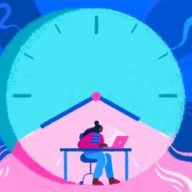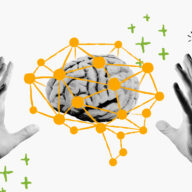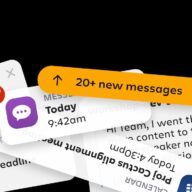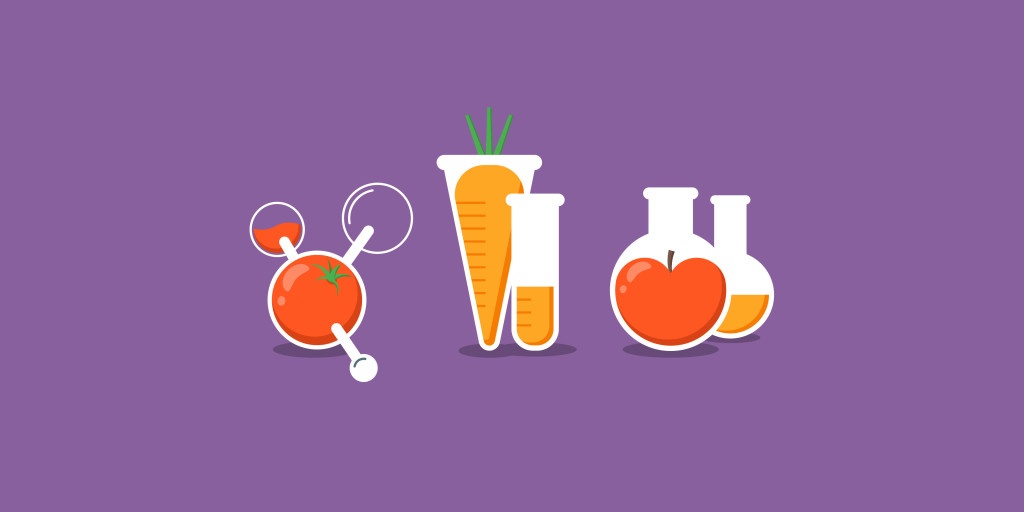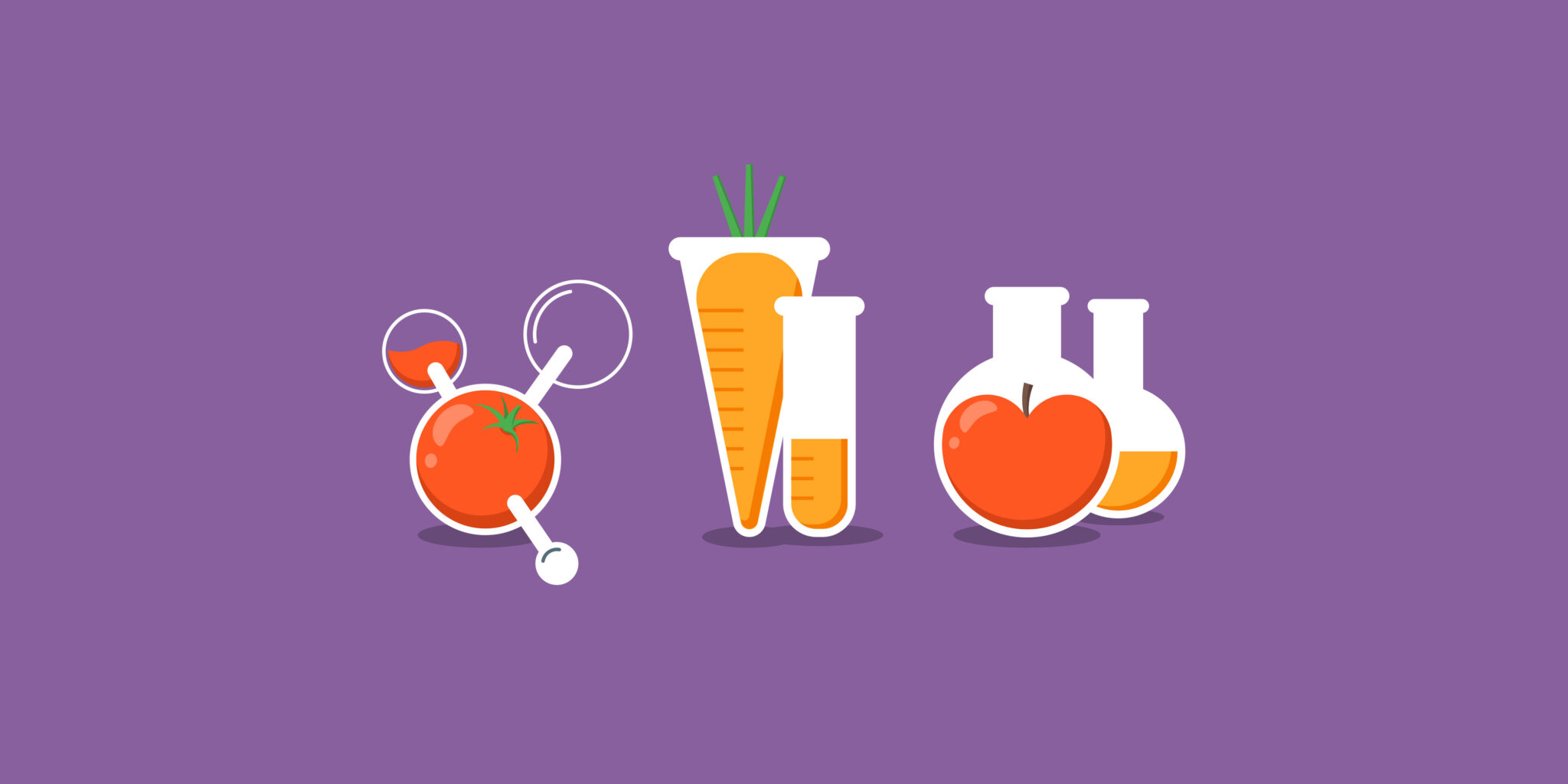
This morning, you woke up well-rested and ready to seize the day. You’re whistling on the way to work, already envisioning conquering that pesky project, saying something witty to the boss in the elevator and rocking the afternoon presentation. You forgot to pack lunch or snacks, but who cares? You’ll continue to slay the day by grabbing lunch with your new coworker.
By the time you walk into your afternoon presentation after a burger and a soda and a whipped cream-topped coffee, your jaunty morning feels a million miles away. You’re sluggish, tired and can’t believe you have to do this presentation now instead of crawling under your desk to sleep.
Admit it: It’s not uncommon to find yourself in situations where you didn’t have enough energy to make it through the workday productively — and a lot of it has to do with what you mindlessly put in your mouth while working.
We are what we eat and drink. Our brains consume 20 percent of all the calories we eat or drink in a day, and the quality of our nutrition has a direct impact on how alert and productive we feel. While you’re spending time optimizing your workspace and workflow for maximum productivity, don’t forget to optimize your meals and snacks, too.
Your Brain Is Food-Sensitive
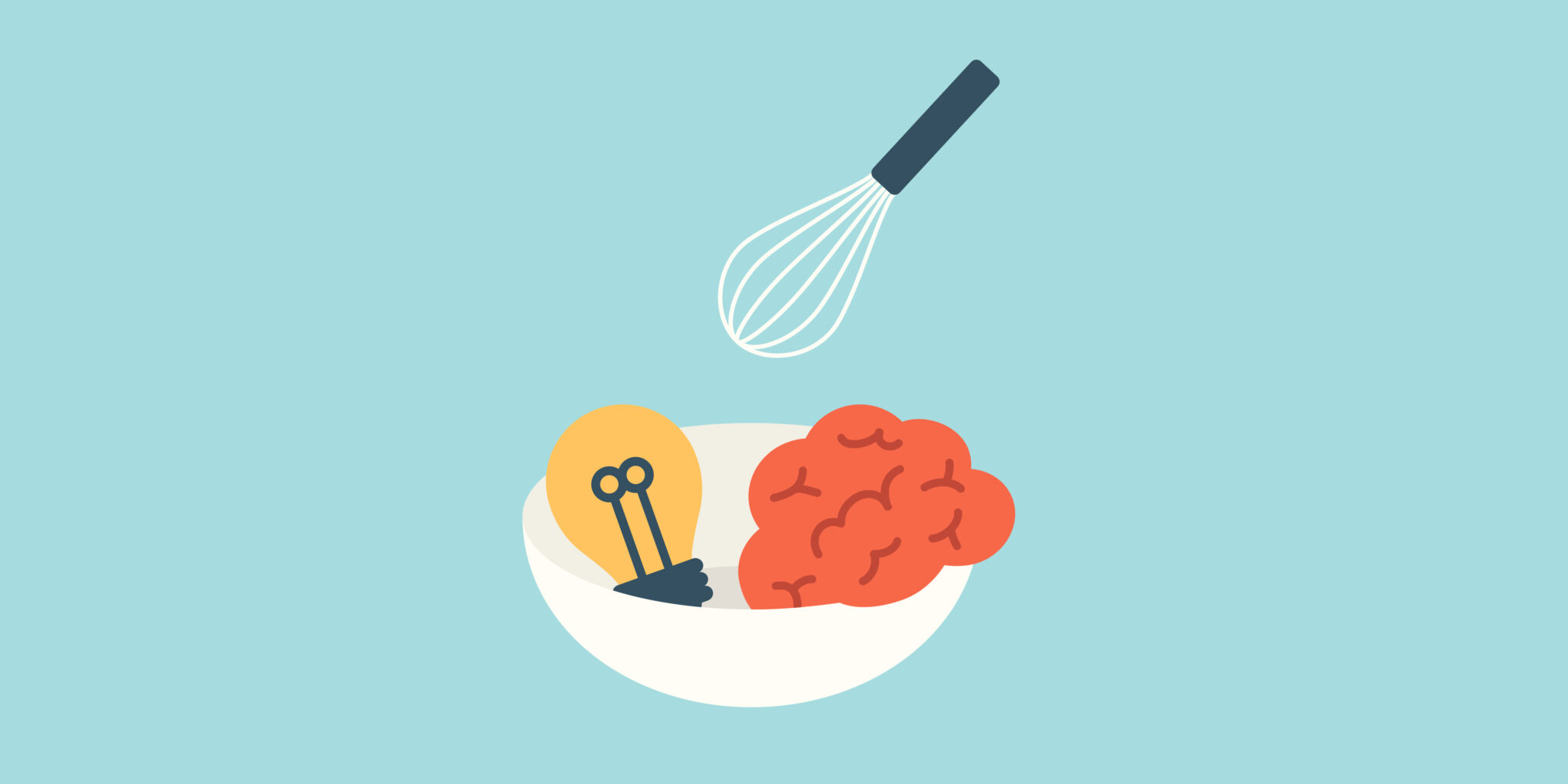
You’d be shocked to learn how fast what you eat begins affecting how you think and process. A slice of cake could cause your blood sugar to spike as soon as 15 minutes after you eat it, and cognitive impairments start soon after.
In the long term, super-fatty diets increase our risk of neurological dysfunction, while diets full of omega-3 fatty acids (think fish and nuts) help us stay sharp and stave off cognitive declines later in life. The truth is, fast-acting foods can almost instantly make or break your productivity for the rest of the day.
Your body turns everything you eat into a compound called glucose, which your body and brain use as fuel to keep you going. The things you eat affect how much glucose you can use and how much other stuff you have to fight against in your system.
Start on the Right Foot
If you’re already taking the time to set the tone for the entire day with a solid breakfast, then keep up the good work!
If you’re an expert snooze calibrator and sleep until the last possible second, making time for breakfast might sound like advice to skip. But trust the experts: it’s worth taking the time to eat breakfast to reap the productivity benefits all day long.
Eating breakfast kickstarts your metabolism, or the process of converting your food into energy, at exactly the right time of day.
Just take a look at your blood glucose levels with and without breakfast:
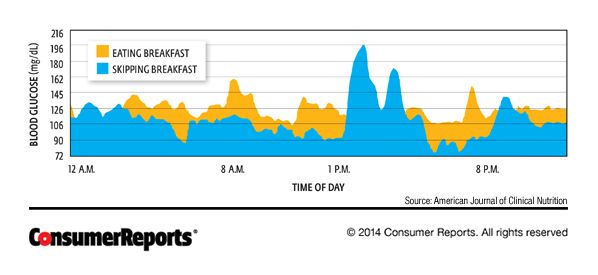
Image source: Consumer Reports
If you skip breakfast, you end up with a huge spike in blood sugar and then an equally huge crash in the afternoon; whereas if you eat breakfast, you maintain a pretty stable metabolism all day long.
If you’re short on time, you can take breakfast to go. Just make sure you focus on foods that will give you the right kind of energy boost in the morning. Avoid foods high in sugar (sorry, beloved Cocoa Puffs) and try these instead:
- Lowfat dairy, like yogurt and skim milk.
- Lean protein, like hardboiled eggs and peanut butter.
- Whole grains, like whole-wheat toast or bagels, or cereals with lots of grain content.
- Fruits and vegetables of all kinds, which could easily be eaten on the go or made into a smoothie.
Focus On Brain Foods
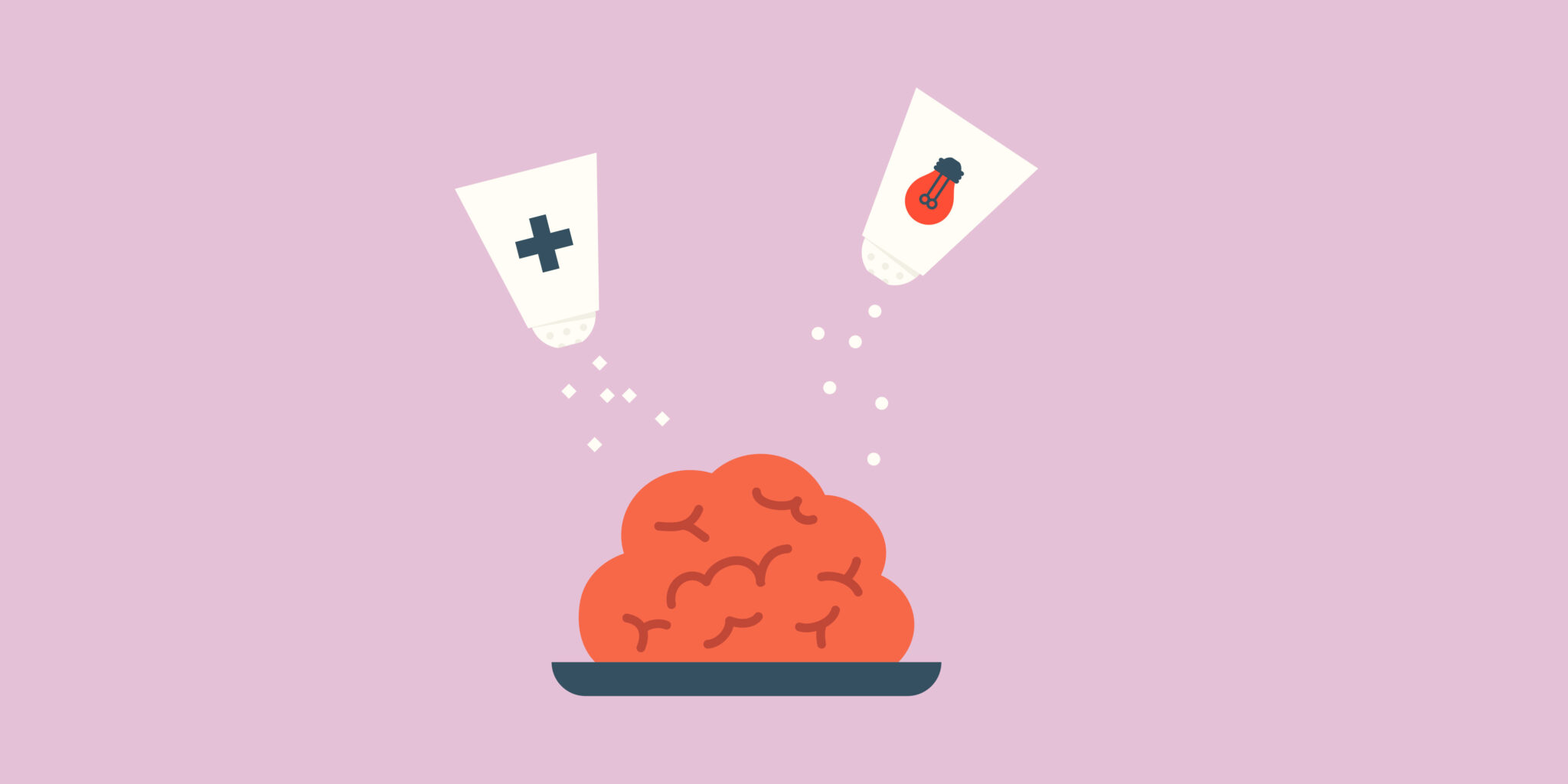
Our brains also run on glucose, with about 0.88 ounces or 25 grams being the optimal amount in our systems at any one time (that’s about a banana’s worth, for scale).
Some brain food facts to keep in mind for a productive mind and body include:
- High blood sugar temporarily impairs your memory, so sugary desserts or sodas can make it hard to focus.
- The brain runs on glucose, and the optimal amount is about 0.88 ounces or 25 grams of glucose in our systems at once (about a banana’s worth). More frequent, smaller meals can help you keep your glucose levels constant.
- Saturated fats increase your chances of memory issues, which can seriously hamper not only productivity, but your everyday life.
To stay productive, pack a lunchbox or snack bag full of glucose-rich, lower-sugar foods. Focusing on smaller meals heavier in glucose throughout the day instead of sugar-rich snacks can help keep you alert, sharp and productive.
Try to avoid skipping meals, even if you’re crazy busy. Packing your lunch at home or having a supply of backup snacks in your desk can help you avoid a glucose crash. Nutritious snack foods to keep us in a productive mindset at the office include whole grains, tuna, berries, carrots, nuts, dark vegetables like kale and spinach, and grains like quinoa.
What You Put In Your Mug Matters
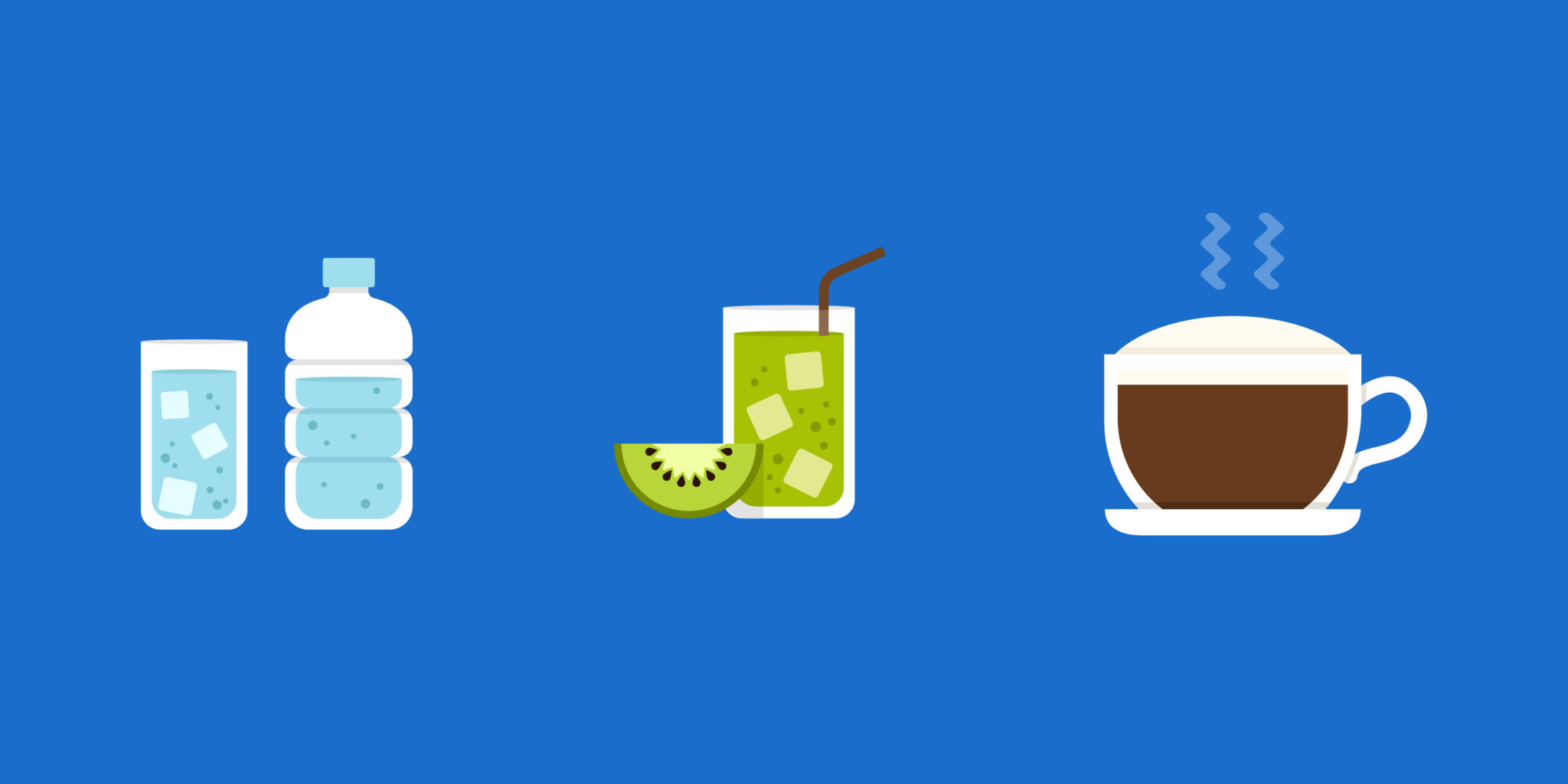
Your brain cells need consistent fluid levels to function. When you’re dehydrated and thirsty, short-term memory will suffer. In the short term, you’ll feel tired and have difficulty focusing. If you’re consistently dehydrated, you could even start experiencing depression, anger and sleeplessness.
Brain cells require two times more energy than other cells in your body, which means keeping your brain fueled with food and drink could be the difference between mental clarity and total brain fog.
What you’re sipping on is just as important as what you’ve packed in your snack bag, so if you’re experiencing trouble with focus and productivity, consider whether you’re reaching for a water bottle or a soda can in between bites.
Rejoice! That 8 Cups Of Water Adage Is A Myth
Mind you: water is still important.
To fuel your most productive workday, put water in your to-go mug (or grown-up sippy cup) instead of coffee.
Plain old, unvarnished, unadorned water rises to the top of the pack in terms of “how to not mess up hydration.” Our bodies are 60 percent water. We need to stay hydrated to survive.
Drinking water can actually boost your energy levels during the day. Researchers found that drinking about 17 ounces of water could temporarily raise your metabolism, or the rate at which you process food, by up to 30 percent. Taking in the equivalent of 68 ounces of water in a day can actually give you 96 calories more energy expenditure in a workday.
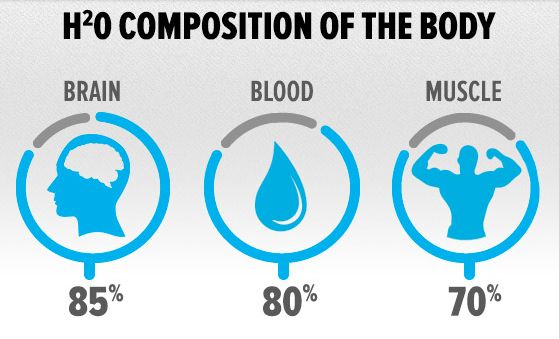
Your body is 60% water overall, but your brain is a whopping 80%, so hydration matters a ton for cognitive performance. Image source: BodyBuilding.com
Recommendations for water consumption ebb and flow every few years. If you grew up with the old saw “eight 8 oz. glasses of water a day,” then consider some of the newer research out there.
In a study published in the British Medical Journal, researchers showed the “eight glasses of water a day” likely came from a 1945 Food and Nutrition Board recommendation that adults drink 2.5 liters (or about 84 fluid ounces) of water per day. That recommendation also said, however, that “most of this quantity is contained in prepared foods.”
That’s right. You actually get a ton of your hydration from the food you eat and non-water liquids. While water is the best hydration source, you shouldn’t feel the need to chug two 32-oz. Nalgene bottles of plain water to stay healthy. You can also get hydrated from fruits, vegetables, juice, beer, wine, tea and coffee (more on that later).
If you’re looking for the perfect water consumption level to feel fresh and on-point all day long, a lot of expert advice boils down to: everyone’s ideal consumption depends on a lot of body and environmental factors, so just don’t get dehydrated.
You’ll know you’re dehydrated if you’re already thirsty, or if you’re looking down at a dark yellow hue before you flush.
Coffee’s Insidious Trick: It’s At The Cellular Level
If you love coffee, then you know what’s so great about it. Coffee makes us feel more alert and staves off tiredness to help us be more energetic and productive.
Coffee’s magic trick happens at the cellular level. Caffeine, the active ingredient in coffee, mimics naturally occurring molecules called adenosine. The more adenosine in your body, the sleepier you feel. As you sleep, your adenosine concentration slowly gets depleted, pushing you along the sleep cycle into wakefulness.
Because your brain cells think caffeine molecules are adenosine molecules, it allows those caffeine molecules to bind to the receptors where adenosine would normally take its rightful spot. Since the caffeine hijacked its place, the built-up adenosine fades away. Less adenosine = less tired.
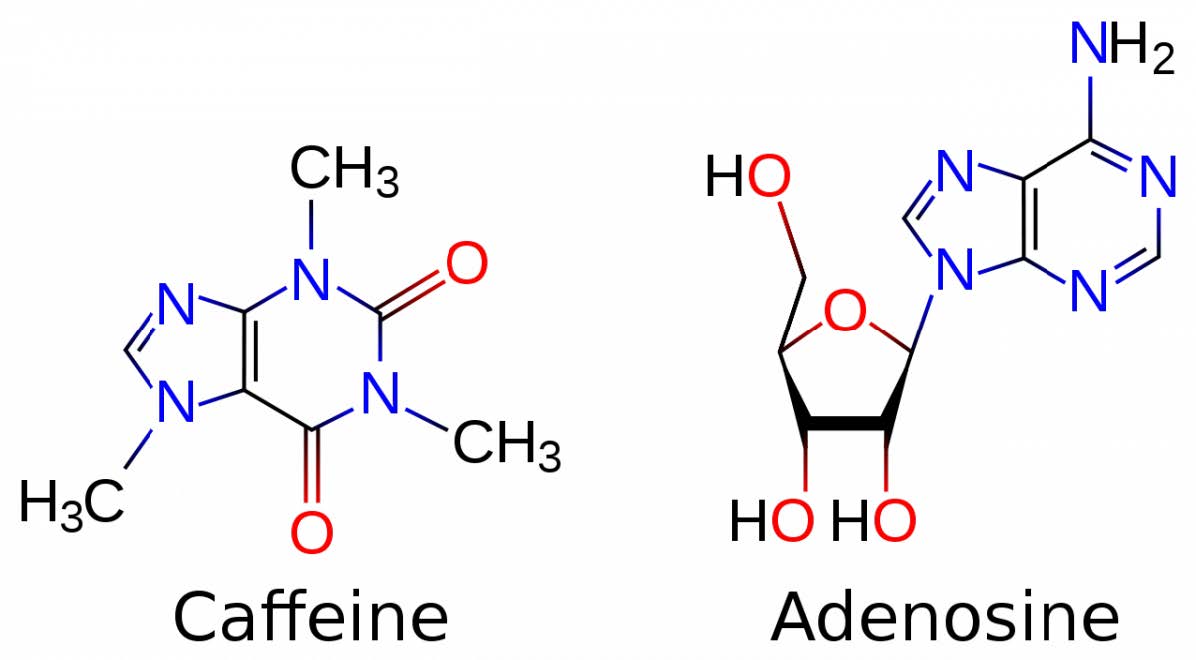
These molecules look the same to your brain cells, which means that coffee can fool your body into wakefulness. Image source: Business Insider
You may have also heard that coffee makes you dehydrated because it’s a diuretic, increasing your urge to urinate. Turns out, that’s not backed up by science. When researchers studied coffee consumption and dehydration, they actually found that you can get hydrated from coffee.
So, what about the bad news?
Well, coffee might not be doing as good a job of keeping you alert as you think. The “boost” you feel from your beloved gallon of joe might also have severely diminishing returns. The more you drink, the worse it could be.
Lurking under the medical terms in this Human Brain Mapping study is a horrifying fact for fellow coffee lovers: if you drink coffee at moderate to high volumes (405 to 905 mg per day), you must keep drinking those high levels or risk impairing brain function.
If you’re a normal person who doesn’t know their intake of caffeine down to the milligrams, that’s about 3.5 to 7.5 eight-ounce coffee cups’ worth of caffeine. If you’re like me and have a much larger coffee mug that you refill multiple times a day, you could already be in the problem zone.

Your brain on caffeine. It shows moderate and high users with far less cognitive brain function (the yellow, orange and red parts) after going without coffee. People who consumed low amounts saw no negative effects after abstaining. Credit: Human Brain Mapping
The problem with consuming more coffee to maintain brain function: if you drink it early in the morning, you’ll have to drink even more coffee to fight your natural cortisol levels. Talk about a vicious cycle!
Your body naturally produces cortisol early in the morning, keeping you awake. Cortisol levels rise and fall throughout the day, so you should be drinking coffee during low times because coffee stimulates cortisol production.
For the most productive coffee consumption, drink fewer than 3 eight-ounce cups of coffee a day, consumed between 10 a.m. and noon, or 2 p.m. and 5 p.m., when your cortisol levels are lowest.
If you’re a medium to high-level coffee drinker, you might need to slowly reduce your intake and time it properly, or else you’ll eventually need gallons of the black stuff to even maintain zombie state.
Your Ideal Food And Drink “Stack”
We spend a lot of time thinking about how to get all of our work done. We read about all the ways to solve our productivity issues. We try timer apps and standing desks and “hacking” our routines.
Like anything that’s worth doing, there’s no shortcut to getting to our best selves — at work or at home. Understanding how things like food and drink can directly affect your ability to do your best work in a timely manner is only half the equation. It may only be a quarter of the equation.
The rest? Making the commitment to address the problem and experimenting to figure out what works best for you.
If you think you could improve your workday through better nutrition, take the time to discover what that means for your schedule, diet and needs. In the same way you optimize your app stack and get the right tools for the job, optimize your nutrition “stack.” It’ll improve your overall health and help you avoid being sabotaged by your own biology during your next big presentation.















